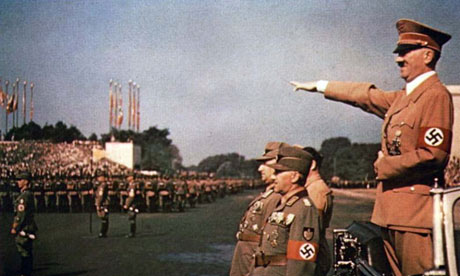This is one of the most extraordinary books you will ever read. It is the occasional diary, kept spasmodically between May 1936 and October 1944, of the novelist who called himself Friedrich Reck-Malleczewen (his name was Reck, but he added the name of his estate, bought with the proceeds of his popular fiction). The diary starts with some amusing anecdotes about the historian and philosopher Oswald Spengler, such as his eating, at a time of rationing towards the end of the first world war, an entire goose without offering his fellow diners a bite. "The most humourless man I have ever met," says Reck, surpassed in this only by "Herr Hitler".
And from then on it's more or less all about Hitler – or rather, about daily life under the Nazi regime. "My life in this pit will soon enter its fifth year," he writes in August 1936. "For more than forty-two months, I have thought hate, have lain down with hate in my heart, have dreamed hate and awakened with hate. I suffocate in the knowledge that I am the prisoner of a horde of vicious apes, and I rack my brains over the perpetual riddle of how this same people which so jealously watched over its rights a few years ago can have sunk into this stupor …"
The motif of hatred returns again and again. He bursts with it, the way some people burst with love; and it was this hatred that compelled him to write these diaries, and then, when he had finished for the evening, take them out in a tin box and hide them in the woods on his land, for, as you can imagine, their discovery would have resulted in a death sentence (he was eventually arrested for the offence, by then in effect a capital one, of "insulting the German currency", having complained in a letter to his publisher that inflation was eating away at the value of his advance. He was packed off to Dachau, where he died in 1945.
Many have come, especially since the publication of Daniel Goldhagen's Hitler's Willing Executioners, to think of the vast majority of the German population as having been complicit in the very worst of the Nazis' crimes; a depressing and controversial point of view, and one that has been desperately attacked ever since. But if you throw enough mud, some of it tends to stick, and Goldhagen is not to be lightly dismissed. Reck's book, which eventually gave him posthumous renown, is a valuable corrective.
Playing the part of the civilised, arch-conservative country squire, his castle stuffed with medieval knick-knacks and first editions, he berates with venom the mind of "mass-man", with no more individual volition than that of a termite, enthusiastically parroting the moronic slogans of Hitlerism. But there is sound common sense in the Bavarian mind, he assures us, especially among the working class (he is deeply suspicious of the middle classes who flocked to Hitler's banner), and he gives the impression that a significant subset of southern Germans are actually willing the Allies to win, for only in the destruction of Germany can it be saved.
Reck can come across as a snob at times, but the prose is so good, and the judgments so astute – when he speculates about the future he is often right – that his position makes sense. His thoughts on Christianity are also worth paying attention to, whether you are religious or not. It is also pleasing to note that there was not a trace of antisemitism in him, and he foresaw that the Nazis' attitudes to the Jews would one day bring the country to its doom.
Meanwhile he dreams up names for Hitler – "the middle-class Antichrist" or "the Machiavelli for chambermaids" – and rails against the Prussian mindset which allowed such a man to thrive. He even castigates the officers behind the July 1944 assassination attempt – despite his wish that it had succeeded – for having hitherto betrayed both the republic and the monarchy, which is an original position. This is one of the most important personal documents to have come out of the war.







